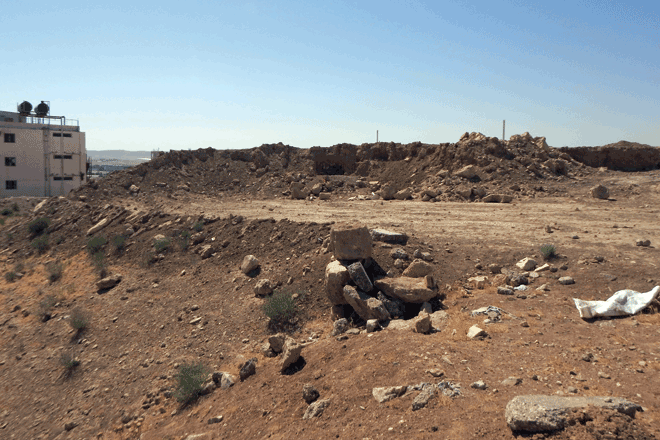Record added successfully


Near the entrance to Ramtha, in Irbid, lies Tell Al Rumayth, a fortified settlement situated at the southern borders of the Aramean Kingdom of Damascus.
“Along with other fortresses in the region, such as the fortress at Fudayn, its main function was to protect the east-west route and to defend the southern frontiers of the kingdom,” noted Jordanian archaeologist Mohammad Najjar,

Archaeological investigations at the site that took place during the sixties of the last century have demonstrated a continuous occupation during the Iron Age II period (10-9th century BC), through Hellenistic, Roman-Byzantine and Islamic period, the scholar said.
“The site is located approximately two kilometres directly to the east of Jordan University of Science and Technology (JUST) in an area that is witnessing rapid urban development. The hill is already surrounded by apartment buildings from its three sides,” warned Najjar.
“A section of the site exposed in a bulldozer cut in its western and northern sides. Bulldozing activities can be seen at the top of the site, probably as preparation of new constructions. In the bulldozer cut and on the top of the site pottery sherds from different periods [mostly Iron Age] can be seen. Some human bones were also noticed, probably originated from bulldozed tombs around the Tell All Rumayth.”
As an important archaeological site with lots of research potential, the hill should be protected under the Antiquities Law of Jordan, Najjar underlined, adding that archaeological research at the site were abruptly halted because of the June War back in 1967 and only the north-western corner of the site had been probed.
“More archaeological research is very much needed, and taking into consideration the close proximity of the site to JUST, Tell Al Rumayth, with proper archaeological excavations, conservation and interpretation can be a remarkable landmark of Jordan’s archaeological heritage,” the scholar said.
--
Source: the Jordan Times.